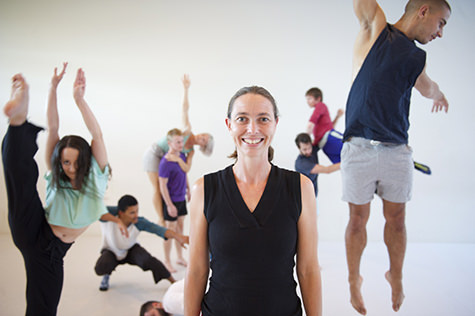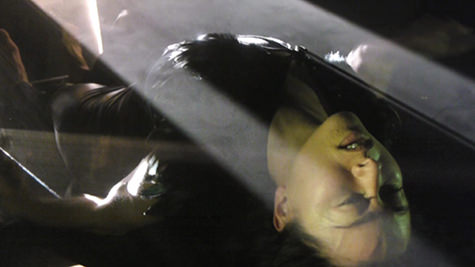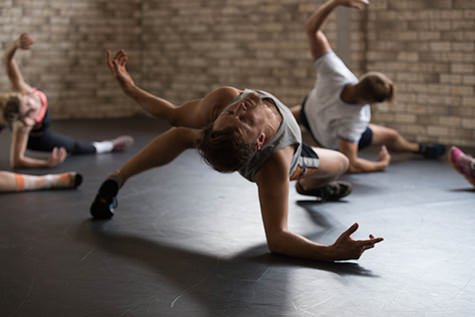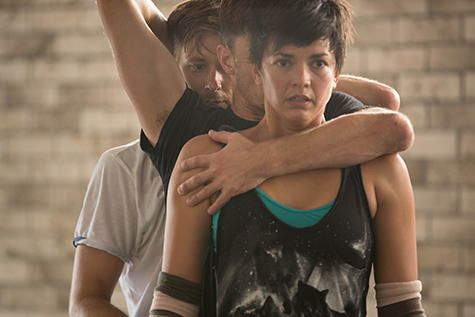A dance-propelled Newcastle
Keith Gallasch: interview Cadi McCarthy, Catapult Dance

Cadi McCarthy
photo Ashley de Prazer
Cadi McCarthy
A functioning dance ecosystem is fuelled not only by talent, training, education and the making of works, but by choreographic hubs—like Sydney’s Critical Path and Perth’s STRUT—and Melbourne’s Dancehouse, an incubator and producer of new work. These have become organic components of Australian independent contemporary dance, fuelling emerging and established artists with classes, national and international guests and the exchange of practices and ideas. In coming weeks we’ll interview Claire Wickes, director of Critical Path, and Angela Conquet, director of Dancehouse, but first, we spoke with Cadi McCarthy, director and founder of Catapult Dance, the latest addition to Australia’s evolving dance ecology, one which adds a significant and much needed regional dimension for dance in New South Wales, embracing Newcastle and the Central Coast and Greater Hunter regions.
One of the key components of Catapult’s activities is the Propel artist-in-residence program in which McCarthy invites innovative choreographers to Newcastle, pairing them with artists from a variety of fields to create cross-artform works. Two Propel works from 2015-16—one by choreographer and dancer Kristina Chan and Newcastle filmmaker Neil Mansfield and the other by choreographer Josh Thompson and local composer and musician Zackari Watt—will soon be shown in re-worked versions at Newcastle’s Lock-Up, an adventurous gallery showing visual, sound and performance art.

Kristina Chan, Laser Box
image Neil Mansfield
Kristina Chan, Laser Box
The other 2015 Propel collaborations teamed choreographer Adam Blanch with Neil Mansfield, choreographer Marnie Palomares with fashion designers High Tea with Mrs Woo; and choreographer Miranda Wheen with visual designer Jessica Coughlan.
McCarthy, a 2007 Churchill Fellow, has had an extensive career as dancer and choreographer, in dance education and as Artistic Director of Perth’s Buzz Dance Theatre, 2009-2013, making work for a variety of age groups including Look the Other Way, winner of a 2014 Australian Dance Award for Outstanding Achievement in Youth and Community Dance. Now she’s created a dance home in which to house her talents and a vision for the benefit of a new generation of artists in regional Australia.
I spoke by phone with the passionately committed McCarthy about Propel. She told me that there had been Propel showings from August 2015 to January this year. She hoped to soon commence a new cycle, depending on funding, but in the meantime Propel will live on in the form of performative installations at Lock-Up, a repurposed police station and women’s prison. In Propelled, Chan and Thompson and their respective collaborators will each occupy a half of the gallery with duets danced in various rooms, promising, says McCarthy, “quite a beautiful experience.”
I asked McCarthy about her motivation for establishing Propel? She explains that after running Buzz dance company in Perth she’d come to Newcastle where she found there were many artists “but not so much contemporary dance or professional dance practice. I thought, wouldn’t it be fantastic to bring contemporary choreographers to collaborate with Newcastle-based artists working across disciplines in a three-week intensive program to see what they could come up with. I also wanted to open Newcastle artists’ eyes to contemporary dance because it hasn’t been so much part of the culture here. There was also the idea of bringing regionally based artists together with nationally based artists to see how that collision of ideas could work.”
McCarthy said that the choreographers “have been mainly creating solo works but Joshua Thompson worked with a cast of five dancers and Adam Blanch, who was involved in our first residency, worked with a cast of two. It’s up to each of the choreographers. Some have worked with film or created work on themselves. Some of the dancers are local. I’m trying to create opportunities for emerging artists in Newcastle to work at a professional level.”
Is the talent there in Newcastle, I ask. “Yes, there’s an amazing number of dance schools and young people who train in dance here, but they often leave once they get to a certain level. What I’m trying to do is to bring them back and say, hey, there are some opportunities here, some professional practice starting to happen, so come back and work with the artists [I’ve invited]. It springboards them into the professional dance world. I also try to provide work experience for Year 12 students so they get an understanding of what the practice is. So it’s about education on many levels about contemporary dance, as well as interdisciplinary practice between dance and other art forms, which I’m very interested in—the idea of pure collaboration where you both walk into the space and no-one is dictating what the terms are, and you’re working together.”

Joshua Thomson, Zackari Watt & Dancers, Propel workshop
photo Jhuny-Boy Borja
Joshua Thomson, Zackari Watt & Dancers, Propel workshop
Do these artists have any prior knowledge of each other? “No, they don’t. I set up a situation where they can talk to one another for many months before the residency begins. They come up with ideas, they Skype, bounce ideas off each other. The works that have come out of these collaborations have been incredible.”
How do you choose the artists? “With the first residency I curated it based on artists I thought would come up with interesting and diverse things. Adam Blanch was formerly with Sydney Dance Company; Kristina Chan has worked in numerous collaborations. They interested me as emerging choreographers and I’ve had a lot of interaction with each of them throughout my own career as they’ve been growing as artists. They’re all NSW-based artists. That was my starting point because I wanted to have people who were close by, but I’m hoping the next Propel is going to expand beyond that.”
McCarthy says she’s still quite new to Newcastle, so some of the building of collaborations has come though word-of-mouth. I wanted a range of disciplines—composers, filmmakers, fashion designers…I just took note of what was happening in the community and asked, would you be interested? Since the first program, I’ve had lots of Newcastle artists approach me and ask, can I please be part of it. I actually have a waiting list of artists who are desperate to work in this way. It’s fantastic.”
What is Catapult, the structure within which Propel works? “We’re a not-for-profit organisation with three strands. There’s the Propel professional residency program. Then throughout the year there’s the Flipside youth project. Marnie Palomares is currently working here and Kristina Chan coming up—high calibre choreographers working intensively with young people. Then there’s the community program where we run classes, master classes and other programs for young people and adults who are interested in dance. So everyone gets to work with these professional artists and see how they approach choreographic practice. What I also try to do with the Flipside program is to provide some paid work in the form of opportunities for Newcastle-based artists to compose music alongside the choreographers. So I’m really trying to engage the whole community in different ways.”
And what are the practicalities of survival for Catapult? “The initial Propel program was funded by the Australia Council and the Flipside project by Arts NSW. We also receive some support from the City of Newcastle. Community support has been quite good. Basically, I just arrived and set up and said, ‘this is what I want to do and the community has embraced that’.”

Angelyn Diaz
photo Jhuny-Boy Borja
Angelyn Diaz
And you found a building in Newcastle to house your vision? “I’ve established a purpose-built space with two quite big studios with sprung floors. I did it independently. And then I built the organisation around the space. Always, part of the battle is to find the right space so that was really important to me, to find a space that I could then fill with activities.”
Do you feel a strong commitment to Newcastle? “Yes, I do. Now that I’ve started Catapult I’m committed to making it work and to bringing artists here. My long-term goal is to make Newcastle a regional hub for contemporary choreographic and interdisciplinary practice. It’s a rather large town—the second largest in NSW—and there just hasn’t been this kind of support for contemporary dance in the region. Hopefully it will all work.”
Our discussion returns to the forthcoming Lock-Up season, a free access exhibition for the audience to move through. McCarthy suggests taking a look at a video of the Chan-Mansfield work which she describes as “absolutely stunning.” Joshua Thompson and Zackari Watt add to the excitement with their installation featuring well-known dancer Craig Bary and Newcastle dance and theatre practitioner Angelyn Diaz performing with reactive light and sound technologies. For Newcastle, already a city with a strong artistic bent, the addition of a contemporary dance hub with cross-artform inclinations should be a very welcome development.
The Lock-Up & Catapult Dance, Propelled, The Lock-up, Newcastle 29-30 April
RealTime issue #132 April-May 2016, web






